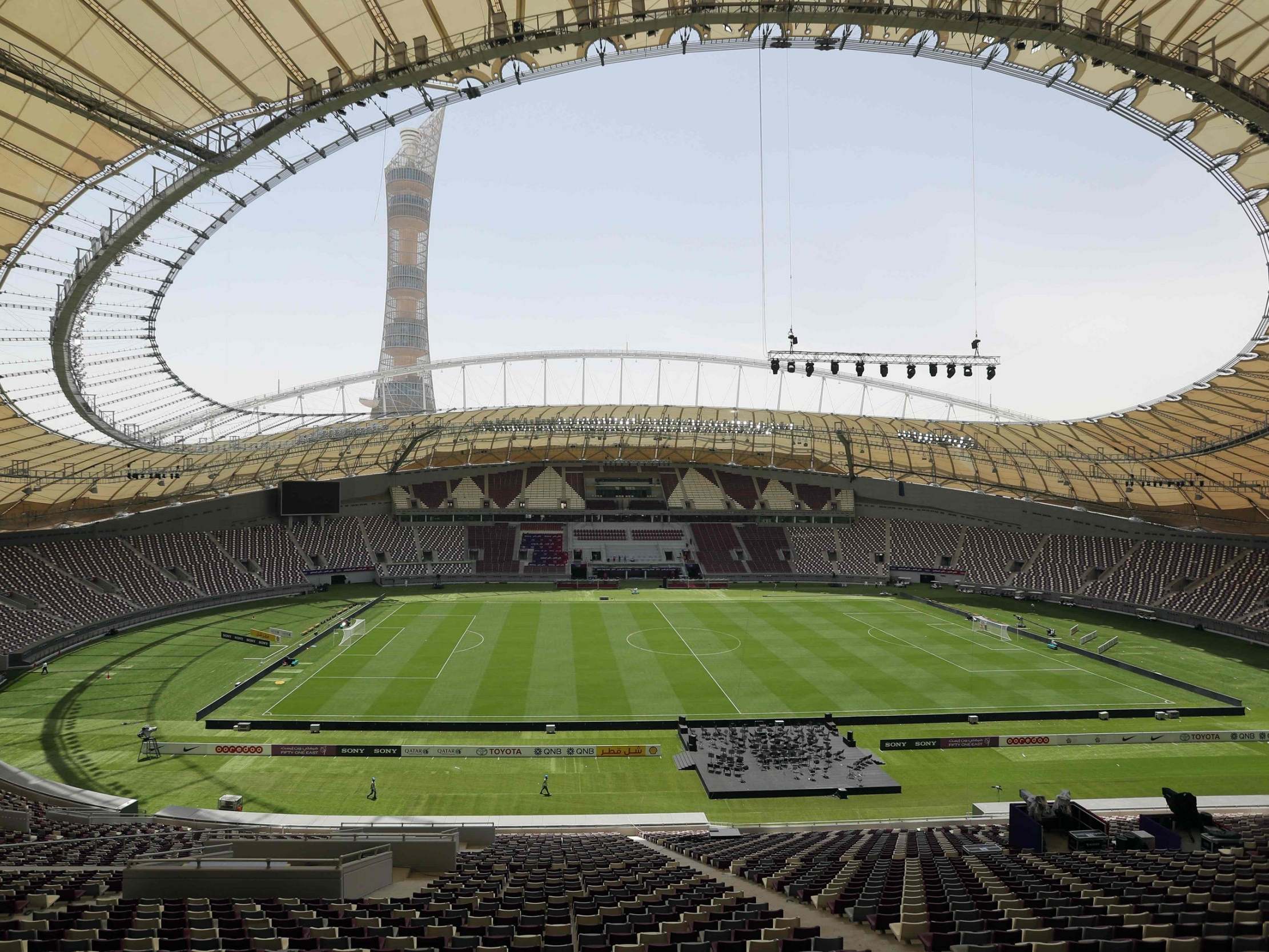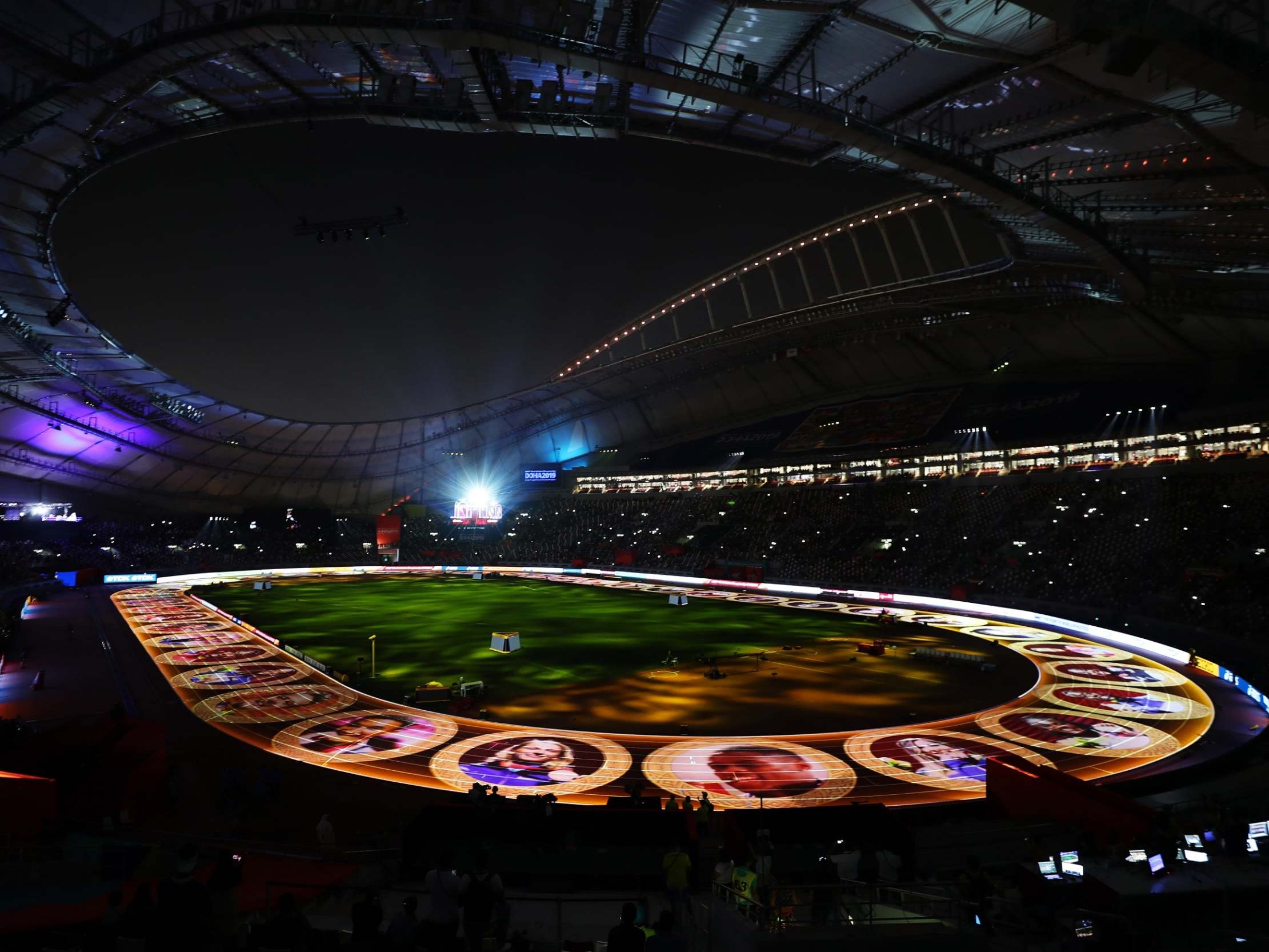The Independent's journalism is supported by our readers. When you purchase through links on our site, we may earn commission.
Liverpool, the Club World Cup and the ramifications of a potential boycott over moral concerns
Jurgen Klopp’s Reds will play at the Khalifa International Stadium, Qatar next week, where a worker died in 2017 due to unsafe conditions

As the Liverpool players gather on the Khalifa International Stadium pitch in Qatar on Wednesday, it will be impossible for them not to look up the impressive scale of the venue... but it should be even more difficult not to consider something else.
If you look at a certain spot in the structure, it is where worker Zachary Cox fell head-first 130 feet to his death in 2017, after an “inherently unsafe” hoist had snapped.
Veronica Hamilton-Deeley – the coroner at the inquest – ruled that was because “workers were being asked to use equipment that was not fit for purpose”, with one key factor the decision to speed up the building of the stadium’s roof.
Cox’s tragic fall was both the only death suffered by a westerner and the only death that actually took place inside a stadium in the construction work for Qatar 2022, but that in turn should put even more focus on the fatalities of so many migrant workers where the details are scandalously scarce. A further tragedy is that we have no clue how many have died in total. The Qataris have not released the figures.
Either way, the true price for venues like Khalifa International Stadium appears to have been many lives.
It should be the most grotesque of thoughts as you prepare for a football match. And if sport was any kind of normal world, it would raise the question of whether you should really be playing there at all.
That in turn raises a number of other questions ahead of this week’s Fifa Club World Cup, that should be put into further focus by decisions like Anthony Joshua’s agreement to fight in Saudi Arabia, given the many human rights abuses there.
What would actually happen if a club like Liverpool, or an international federation like the FA, refused to take part in such an event because of moral concerns over the hosts? What would the fall-out be? What would it tell us about how enmeshed the sport is in geopolitics? Should they even boycott? Is that a fair moral argument?
It perhaps shows how warped football is that there isn’t even really a precedent when it comes to such a situation, despite the prevalence of questionable hosts and competitions.

Before getting into such important hypotheticals, however, the present reality should be considered. Some sources say that the Trades Union Congress has actually encouraged Liverpool to go in order to use their influence as a positive for migrant workers in Qatar, and the club’s general approach has been praised – even beyond the warped nature of the sport.
One senior football executive, after all, privately tells The Independent that the idea of a boycott by anyone would be “pretty remote”.
“I cannot conceivably think of any club or federation that would do it under any circumstance,” they say. “It’s all the usual reasons: power, money and all the usual nonsense that goes on in football with a failure to look at the bigger picture. Everyone pays lip service.”
James Lynch of the Fair/Square human rights organisation says that “lip service” has been pretty much all he’s got back when writing to various stakeholders about such issues. It’s why he praises Liverpool for their level of investment now.
“In general what you get is a series of broad and vague pronouncements, but this is actual engagement with the subject.”

Liverpool refused to stay in Fifa’s initial hotel on moral grounds, and supported campaigns for thorough investigations into the deaths of migrant workers in Qatar – including those of Cox and Rupchandra Rumba, who had been working on football stadiums.
But what would actually happen if they used their status in the world to make the ultimate stand? It would after all bring the protection of an awful lot of good will.
“I think it would set alarm bells ringing around the football world in relation to the World Cup,” Kevin Carpenter, Senior Lecturer in Law at Manchester Metropolitan University, says. “If it was someone like Liverpool, Fifa couldn’t ignore, and the world couldn’t ignore, the issue.”
It says much that Fifa hasn’t ignored the possibility.
That is revealed in the regulations for this week’s event, the following process would take place in the event of a boycott.
Fifa would first bring a charge according to the regulations before their disciplinary committee, who would rule according to the case, after which the club would have the chance to appeal it all the way up to CAS.
There would first of all be a fine of 20,000 Swiss Francs if you withdraw 30 days before the first match, but what Carpenter finds really interesting is the phrasing of what follows. Sub-section 3 of article 6 says: “the FIFA Disciplinary Committee may impose additional disciplinary measures”.
“It basically gives them carte blanche to do whatever they want in terms of sanctions,” Carpenter explains. “I suspect they’d be quite harsh, really, because it is their flagship tournament and the only club event they do.
“I think the interesting part of article 6 of these regulations is probably sub-section 5 which says any participating club that withdraws could be liable to expenses, or to pay Fifa for any damages. So, yeah, if the sponsors were to turn around and say ‘we lost value because Liverpool aren’t there’, then I’m sure Fifa would bring a claim against them for some kind of damages.”
“That’s quite an unusual clause to have in sports regulations.”
And that’s also where it starts to get very complex, and where the complicated geopolitical layers the game is wrapped up in are really illustrated.
Consider the interests involved.
There is first of all the fact Fifa are especially looking to grow this sole club event of theirs, with the next one for 2021 greatly expanded, and planned for an even more problematic venue in China. But there is then what all that is tied up in.
“The thing that strikes me is massive amount of commercial contracts everyone is engaged with,” Lynch says.
There are secondly all of those sponsors, many of them coming from those countries with questionable human rights records – like Qatar Airways, like Wanda – and then the business deals with the countries themselves.
There is then the contracts the clubs and federations themselves have struck. They deal with companies – like, for example, Standard Chartered – who work in all parts of the world.

A major club or federation boycotting an event would threaten all of this, throwing a sudden uncertainty into business deals that had previously gone so smoothly.
This is why a boycott would such be a huge act, and why it is so unprecedented. This is where another dilemma lies. On the one hand, a club of Liverpool’s size have the international status to weather it. On the other hand, it would rip the fabric of the business side of football.
One high-level source who has direct experience of this area says “the pressure would be extraordinary”.
“It would come from multiple directions, too. There are just too many stakeholders. There’d be enormous pressure on the national association, directly from Fifa. And any sanctions could go far as an ability to sign players. There’d be all sorts of Draconian measures.”
Carpenter concurs: “I think the Qataris would be pushing Fifa pretty tough on this… I think they would come down hard – although there would inevitably be comparisons with the recent racism discussions and the proportionality of any sanctions.”
“These are the conflicts throughout,” Lynch adds, before pointing to the roles of the chairman of Qatar Sports Investments, Nasser Al-Khelaifi. “He has about three different hats, including a position of power in Uefa [on the executive committee]. Qatar Airways are sponsoring Fifa. So, where people look for leverage, some of the potentially positive levers to support action on human rights are captured by the people who come under scrutiny.”
This is all why it’s so difficult for clubs, even if they had a will. They’re locked in by so many gold-plated layers, that more than anything else points to how enmeshed the game is in all of the issues of geopolitics.
The only parties who can really change things won’t or can’t because of various pressures.
It is after all putting a lot of responsibility on any club to break from the game’s way of doing things.
That is even more pronounced in the international game because of the greater directness of Fifa’s influence, where their main event is the be-all and end-all.
One source points to how there was a move in 2014 to get the biggest federations – including England and Germany – to try and combat Fifa corruption by boycotting the World Cup. It was virtually a non-starter. Too many vested interests. And no one wants to strike out on their own.
This is partly why boycotts are so few and far between, and why there are fair questions over whether they work at all.
The most famous and successful, the boycott of apartheid South Africa, was far from even sport on its own.
“It was part of a wider set of political and economic sanctions against the country,” Lynch explains. “So it wasn’t sport in isolation. It was part of an international community position of isolation. That was critical.
“The other element is it was directed against a series of egregious policies that were quite specific. You could almost determine ‘here are the things you need to change’.”
“It needs to be accompanied with kind of a clear explanation, and part of a wider approach. This isn’t me saying ‘don’t boycott things’. It isn’t enough to go, ‘a boycott won’t change things, I’ll just go’. If you’re going to take part in an event – and it could be Qatar, the Bahrain grand prix, Saudi Arabia – use your influence positively. Talk about what’s happening.”
That, for their part, is undeniably what Liverpool are doing. They deserve praise for that.
The wonder will still be what everyone thinks when they’re stood in that stadium.
Join our commenting forum
Join thought-provoking conversations, follow other Independent readers and see their replies
Comments
Bookmark popover
Removed from bookmarks